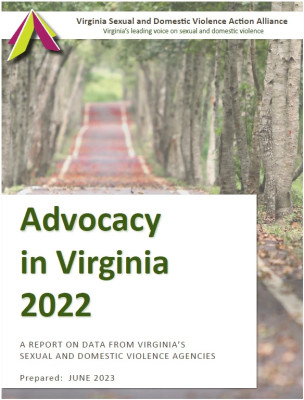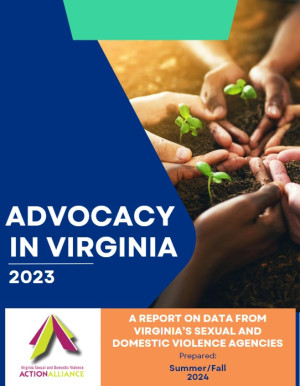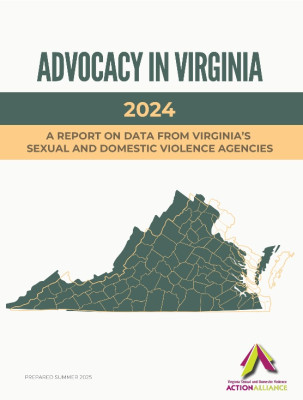Resources Library: Publications/Reports
Start a Search:
Advocacy in Virginia 2022

Virginia's Sexual and Domestic Violence advocates are our community's front-line responders to survivors of violence. They provide not only crisis response and shelter for survivors, but also assistance to meet financial, housing, employment, and legal services needs.
With the continued struggles brought on by the COVID-19 global pandemic, survivors' need for critical services from sexual and domestic violence agencies did not wane. Despite being short staffed, having difficulty maintaining 24/7 shelter coverage, budget cuts, and changes in community partnerships and resources, advocates remained on the front lines to meet survivors' needs, maintaining virtual support opportunities, ongoing safety planning, including better understanding the safer use of technology, and building better relationships with community partners.
Action Alliance staff chose to take a more in depth look at the impact of services on the experiences of survivors since the onset of the COVID-19 pandemic. Take a look at the summary report that demonstrates the continued need for the vital advocacy services provided by sexual and domestic violence advocates around the commonwealth.
Advocacy in Virginia 2023

Virginia's Sexual and Domestic Violence advocates are our community's front-line responders to survivors of violence. They provide not only crisis response and shelter for survivors, but also assistance to meet financial, housing, employment, and legal services needs.
With the continued struggles brought on by the COVID-19 global pandemic, survivors' need for critical services from sexual and domestic violence agencies did not wane. Despite being short staffed, having difficulty maintaining 24/7 shelter coverage, budget cuts, and changes in community partnerships and resources, advocates remained on the front lines to meet survivors' needs, maintaining virtual support opportunities, ongoing safety planning, including better understanding the safer use of technology, and building better relationships with community partners.
Again in 2023, Action Alliance staff chose to take a more in depth look at the impact of services on the experiences of survivors as agencies continue to right themselves due to the impacts of the COVID-19 pandemic. Take a look at the summary report that demonstrates the continued need for the vital advocacy services provided by sexual and domestic violence advocates around the Commonwealth.
Advocacy in Virginia 2024

Each year, we compile and publish an annual Advocacy Data Report that highlights the impact of our statewide network of sexual and domestic violence agencies. These reports provide a comprehensive look at the services delivered, the needs of survivors, and emerging trends in the movement to end sexual and domestic violence in the Commonwealth. By tracking this data, we help inform policy, guide funding decisions, and strengthen our collective advocacy for a Virginia where all people are safe, seen, and supported.
To download the most recent report from 2024, click this link.
Are Victims Services Programs Liable for Criminal “Harboring” When They Work with Immigrant Survivors of Crime?
Community-based crime victim advocacy programs that provide services to undocumented immigrant survivors of crimes can minimize risks to their program, funding, employees, and clients by adopting and following policies that take the laws on harboring undocumented immigrants into account. This Advisory answers common questions about providing shelter and other program services to undocumented victims, describes the law and federal policy (as of the Advisory’s publication date), and proposes best practices for programs, but it is not legal advice. Immigration and criminal laws vary from region to region, and federal immigration enforcement policies are constantly changing. Programs should analyze their program-specific risks, their community’s particular needs, and the laws in their jurisdiction—including legal duties associated with an agency’s funding sources—as they design or update program policies. Consulting a local immigration attorney with criminal law experience is highly advisable.
Barriers to and Promising Practices for Collaboration between Adult Protective Services and Domestic Violence Programs
Barriers to and Promising Practices for Collaboration between Adult Protective Services and Domestic Violence Programs is published by the National Center on Elder Abuse and the National Adult Protective Services Association (NAPSA). This report recommends that Adult Protective Services (APS) and Domestic Violence Programs collaborate on providing services for older adults experiencing domestic violence. Included are potential barriers to collaboration as well as examples of successful collaborations and initiatives.

